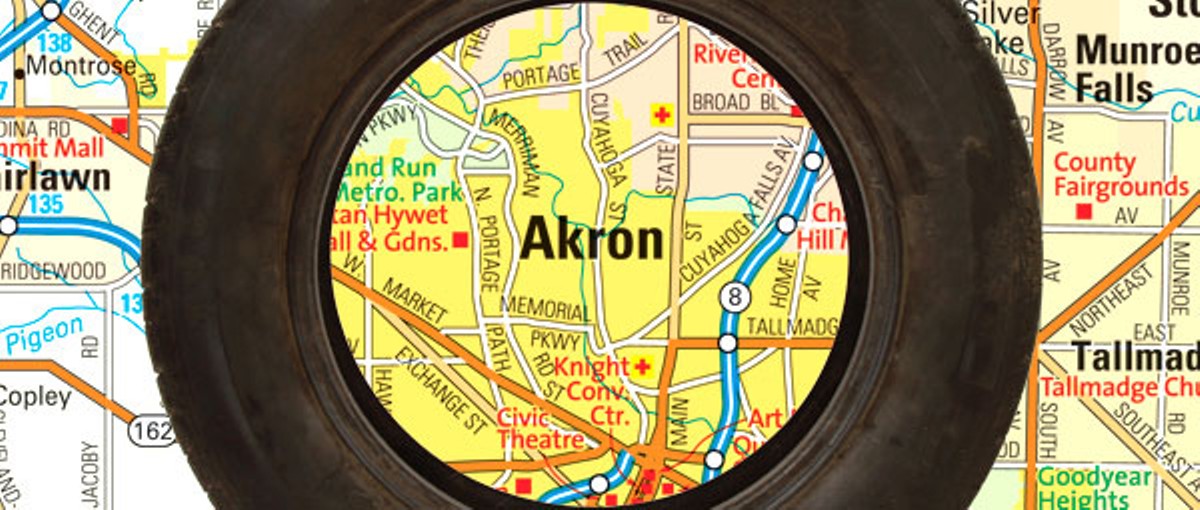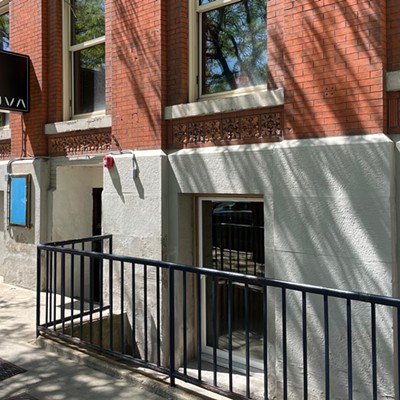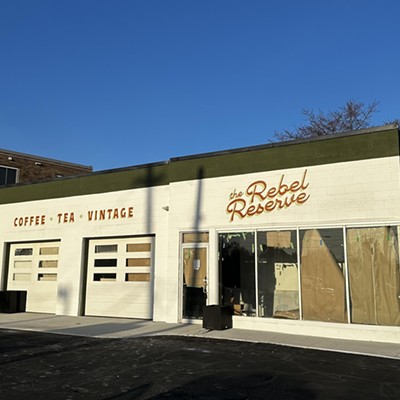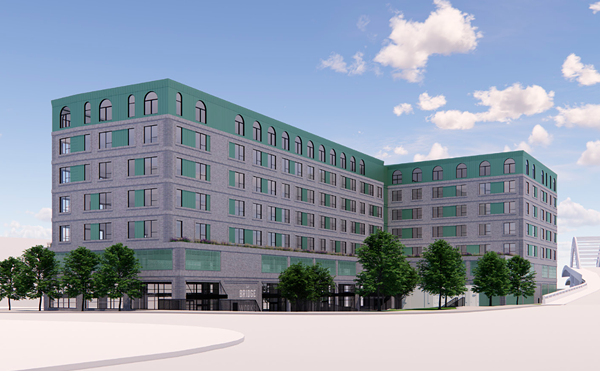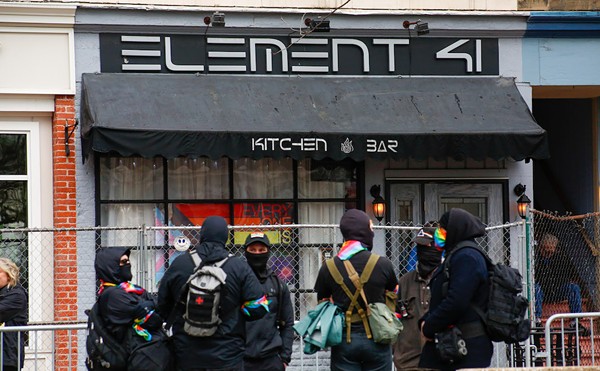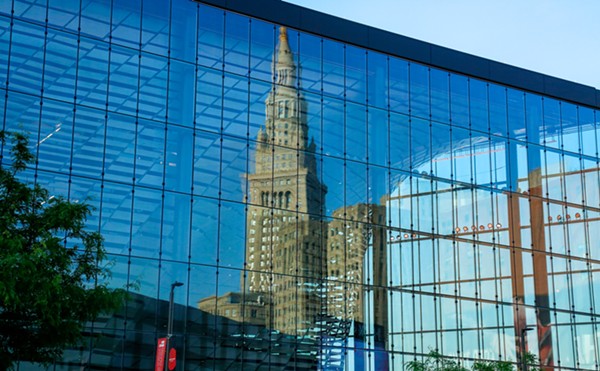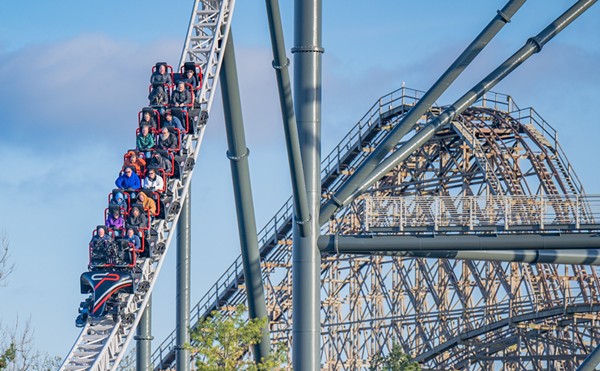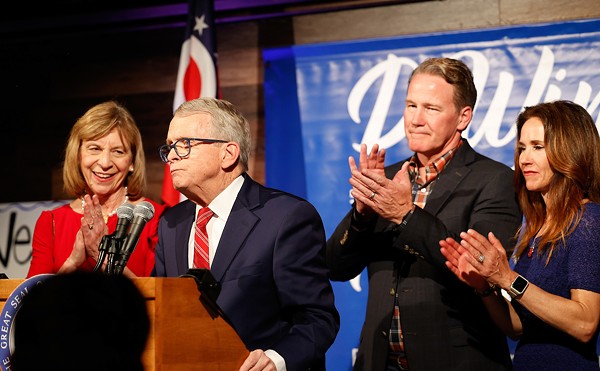Go to sleep, Captain Future, in
your lair of art deco
You were our pioneer of progress,
but tomorrow's been postponed
Go to sleep, Captain Future, let
corrosion close your eyes
If the board should vote to restore
hope, we'll pass along the lie
— The Secret Sound of the NSA, Captain Future
IN THE BEGINNING ...
As near as I can tell, the term "Rust Belt" originated sometime in the mid-1980s. That sounds about right.
I originated slightly earlier, in 1972, at St. Thomas Hospital in Akron, Ohio, Rubber Capital of the World. My very earliest memory is of a day, sometime in the summer of 1975, that my parents, my baby brother, and I went on a camping trip to Lake Milton, just west of Youngstown. I was 3 years old. To this day, I have no idea why, of all of the things that I could remember, but don't, I happen to remember this one. But it is a good place to start.
The memory is so vivid that I can still remember looking at the green overhead freeway signs along the West Expressway in Akron. Some of the signs were in kilometers as well as in miles back then, due to an ill-fated attempt to convert Americans to the metric system in the 1970s. I remember the overpoweringly pungent smell of rubber wafting from the smokestacks of B.F. Goodrich and Firestone. I recall asking my mother about it, and her explaining that those were the factories where the tires, and the rubber, and the chemicals were made. They were made by hard-working, good people — people like my Uncle Jim. But more on that later.
When I was a little bit older, I would learn that this was the smell of good jobs; of hard, dangerous work; and of the way of life that built the modern version of this quirky and gritty town. It was the smell that tripled Akron's population between 1910 and 1920, transforming it from a sleepy former canal town to the 32nd largest city in America. It is a smell laced with melancholy, ambivalence, and nostalgia — for it was the smell of an era that was quickly coming to an end (although I was far too young to be aware of this fact at the time). It was sometimes the smell of tragedy.
We stopped by my grandparents' house, in Firestone Park, on the way to the campground. I can still remember my grandmother giving me a box of Barnum's Animals Crackers for the road. She was always kind and generous like that.
Who were my grandparents? My grandparents were Akron. It's as simple as that. Their story was Akron's story. My grandfather, George Segedy, was born in 1916, in Barnesboro, a small coal-mining town in western Pennsylvania, somewhere between Johnstown, DuBois and nowhere. His father, a coal miner, had emigrated there from Hungary nine years earlier. My grandmother, Helen Szabo, was born in Barberton, in 1920. Barberton was reportedly the most-industrialized city in the United States, per capita, at some point around that time.
They were both factory workers for their entire working lives. (I don't think they called jobs like that "careers" back then.) My grandfather worked at the Firestone Tire & Rubber Company. My grandmother worked at Saalfield Publishing, a factory that was one of the largest producers of children's books, games and puzzles in the world. Today, both of the plants where they worked form part of a gutted, derelict, post-apocalyptic moonscape in South Akron, located between that same West Expressway and perdition. The City of Akron has plans for revitalizing this former industrial area. It needs to happen, but there are ghosts there.
My name is Ozymandias, King of
Kings,
Look on my works, ye Mighty,
and despair!
Nothing beside remains. Round
the decay
Of that colossal wreck, boundless and bare
The lone and level sands stretch
far away.
— Percy Bysshe Shelley, Ozymandias
My grandparents' house exemplified what it was to live in working-class Akron in the late 1970s and early 1980s. My stream-of-consciousness memories of that house include: lots of cigarettes and ashtrays; Hee-Haw; The Joker's Wild; fresh tomatoes and peppers; Fred and Lamont Sanford; Archie and Edith Bunker; Herb Score and Indians baseball on the radio on the front porch; hand-knitted afghans; cold cans of Coca-Cola and Pabst Blue Ribbon; the Ohio Lottery; chicken and galuskas (dumplings); a garage floor that you could eat off of; a meticulously maintained 14-year-old Chrysler with 29,000 miles on it; a refrigerator in the dining room because the kitchen was too small; catching fireflies in jars; and all being right with the world.
I always associate the familiar comfort of that tiny two-bedroom bungalow with the omnipresence of cigarette smoke and television. I remember sitting there on May 18, 1980. It was my eighth birthday. We were sitting in front of the TV, watching coverage of the Mount St. Helens eruption in Washington State. I remember talking about the fact that it was going to be the year 2000 (The Future!) in just 20 years. I remember thinking about the fact that I would be 28 years old then, and how inconceivably distant it all seemed. Things seem so permanent when you're 8, and time moves ever-so-slowly.
More often than not, when we visited my grandparents, my Uncle Jim and Aunt Helen would be there. Uncle Jim was born in 1936, in West Virginia. His family, too, had come to Akron to find work that was better-paying, steadier and less dangerous than the work in the coal mines. Uncle Jim was a rubber worker, first at Mohawk Rubber and then later at B.F. Goodrich. Uncle Jim also cut hair over at the most-appropriately named West Virginia Barbershop, on South Arlington Street in East Akron. He was one of the best, most decent, kindest people that I have ever known.
I remember asking my mother once why Uncle Jim never washed his hands. She scolded me, explaining that he did wash his hands, but that because he built tires, his hands were stained with carbon black, which wouldn't come out no matter how hard you scrubbed. I learned later that it would take about six months for that stuff to leach out of your pores once you quit working.
Uncle Jim died in 1983, killed in an industrial accident on the job at B.F. Goodrich. He was only 47. The plant would close for good about a year later.
It was an unthinkably tragic event, at a singularly traumatic time for Akron. It was the end of an era.
TIMES CHANGE
My friend Della Rucker wrote a great post entitled, "The Elder Children of the Rust Belt," over at her blog, Wise Economy. It dredged up all of these old memories, and it got me thinking about childhood, about this place that I love, and about the experience of growing up just as an economic era (perhaps the most prosperous and anomalous one in modern history) was coming to an end.
That is what the late 1970s and early 1980s was: the end of one thing, and the beginning of a (still yet-to-be-determined) something else. I didn't know it at the time, but that's because I was just a kid.
In retrospect it was obvious: the decay, the deterioration, the decomposition, the slow-at-first and then faster-than-you-can-see-it unwinding of an industrial machine that had been wound up far, far too tight. The machine runs until it breaks down; then it is replaced with a new and more efficient one — a perfectly ironic metaphor for an industrial society that killed the goose that laid the golden egg. It was a machine made up of unions, and management, and capitalized sunk costs, and supply chains, and commodity prices, and globalization.
Except it wasn't really a machine at all. It was really just people. And people aren't machines. When they are treated as such, and then discarded as obsolete, there are consequences. You could hear it in the music: from the decadent, desperately seeking something (escape) pulse of disco, to the (first) nihilistic and (then) fatalistic sound of punk and post-punk. It's not an accident that a band called Devo came from Akron, Ohio. De-evolution: the idea that instead of evolving, mankind has actually regressed, as evidenced by the dysfunction and herd mentality of American society. It sounded a lot like Akron in the late 1970s. It still sounds a little bit like the Rust Belt today.
As an adult, looking back at the experience of growing up at that time, you realize how much it colors your thinking and outlook on life. It's all the more poignant when you realize that the "end-of-an-era" is never really an "end" as such, but is really a transition to something else. But to what exactly?
The end of that era, which was marked by strikes, layoffs and unemployment, was followed by its echoes and repercussions — economic dislocation, outmigration, poverty and abandonment — as well as the more intangible psychological detritus: the pains from the phantom limb long after the amputation, the vertiginous sensation of watching someone (or something) die.
And it came to me then
That every plan
Is a tiny prayer to Father Time
As I stared at my shoes
In the ICU
That reeked of piss and 409
It sung like a violent wind
That our memories depend
On a faulty camera in our minds
'Cause there's no comfort in the
waiting room
Just nervous paces bracing for
bad news
Love is watching someone die...
— Death Cab For Cutie, "What Sarah Said"
But it is both our tragedy and our glory that life goes on.
Della raised a lot of these issues in her post: our generation's ambivalent relationship with the American Dream (like Della, I feel the same unpleasant taste of rust in my mouth whenever I write or utter that phrase); our distrust of organizations and institutions; and our realization that you have to keep going, fight and survive, in spite of it all. She talked about how we came of age at a time of loss: "Not loss like a massive destruction, but a loss like something insidious, deep, pervasive."
It is so true, and it is so misunderstood. One of the people commenting on her blog post said, essentially, that it is dangerous to romanticize about a "golden age," that all generations struggle and that life is hard.
Yes, those things are all true. But they are largely irrelevant to the topic at hand.
There is a very large middle ground between a "golden age" and an "existential struggle." The time and place about which we are both writing (the late 1970s through the present, in the Rust Belt) is neither. But it is undoubtedly a time of extreme transition. It is a great economic unraveling, and we are collectively and individually still trying to figure out how to navigate through it, survive it, and ultimately build something better out of it.
History is cyclical. Regardless of how enamored Americans, in general, may be with the idea, it is not linear. It is neither a long, slow march toward utopia, nor toward oblivion. When I look at history, I see times of relative (and it's all relative, this side of paradise) peace, prosperity and stability; and other times of relative strife, economic upheaval, uncertainty and instability. We really did move from one of those times to the other, beginning in the 1970s and continuing through the present.
The point that is easy to miss when uttering phrases like "life is hard for every generation" is that none of this discussion about the Rust Belt — where it's been, where it is going — has anything to do with a "golden age." But it has everything to do with the fact that this time of transition was an era (like all eras) that meant a lot (good and bad) to the people that lived through it. It helped make them who they are today, and it helped make where they live what it is today.

